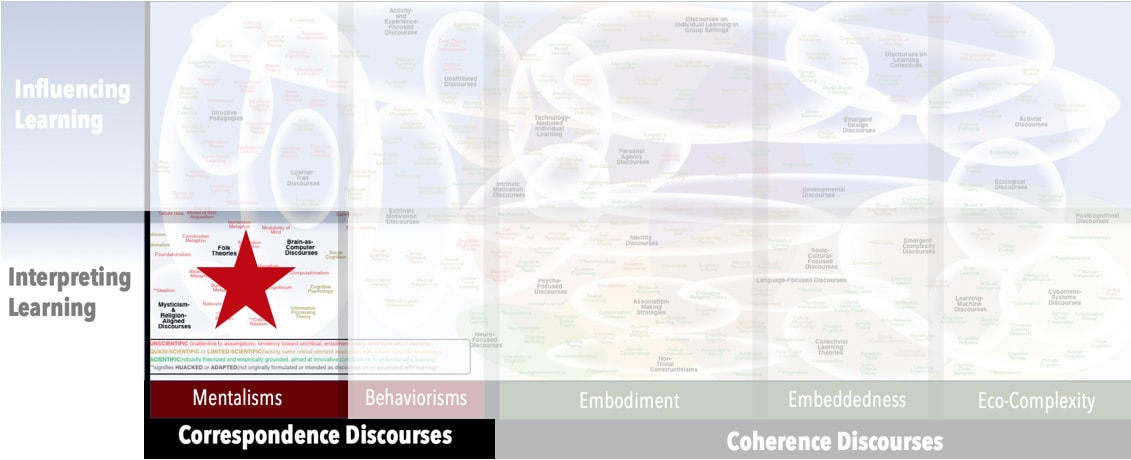AKA
Platonic Epistemology
Theory of Recollection
Focus
Interpreting personal understanding and potential as inbornPrincipal Metaphors
Drawn from and/or aligned with principles in ancient Greek philosophy:- Knowledge is … innate Truth (initially buried deep in the soul, but available for recovery)
- Knowing is … what has been re-membered
- Learner is … a re-collector
- Learning is … re-membering, recalling
- Teaching is … prompting
Originated
Ancient (entrenched in the language)Synopsis
Nativism asserts that personal knowledge, understanding, and ability are innate rather than acquired or developed. It is rooted in Plato’s Innatism (see below). Plato began with the question of how one can learn something totally new. Reasoning that if one knows something, one need not question it, and if one doesn’t know something, one doesn’t know how to question it, he concluded that one cannot learn what one did not previously know. Hence, all learning is merely remembering or recalling. Nativism embraces the same themes, but frames them in terms of genetics and psychology, arguing that beliefs and knowledge are programmed into minds. Associated discourses and constructs include:- Genetic Memory – a complex behavioral pattern that that is manifest prior to opportunity to learn it (e.g., suckling; tracking another’s eye movement)
- Innatism – the conviction that knowledge is already present in one’s mind at birth
- Instinct – a complex behavioral pattern that is triggered by specific circumstance, and that usually involves both inborn and learned aspects. The topic of human instinctive behavior is widely debated and somewhat controversial.
- Intuitionism – the conviction that personal knowledge is derived from intuition – that is, sudden perceptions, impressions, or insights that arrive as strong convictions but without an awareness of origins
- Nativistic Theory (Noam Chomsky, 1960s) – the linguistic theory that humans have an innate knowledge of aspects of language that enable them to master a language with efficiency
- Neonativism (Structural Constraint Theory) – the perspective that holds that (1) much, but not all, of personal knowledge is innate, (2) cognitive development is constrained by biology, and (3) humans are predisposed to engage with and to ignore certain types of information. An associated discourse is:
- Core Knowledge Theory – a discourse concerned with distinguishing “core knowledge” (i.e., innate capacities, those present at birth) from learned abilities. Such core knowledge is generally seen to include competencies associated with social interactions, quantities, and objects.
- Recapitulation Theory (G. Stanley Hall, 1910s) – an adaptation of Ernst Haeckel’s (1860s) theory with the same title, which hypothesized that the development of an embryo mirrors the evolution of its species – or, more popularly, “ontology recapitulates phylogeny.” Hall adapted the theory to the interests of educators in the suggestion that each person’s mental and behavioral development mirrors/recapitulates the evolution of the human mind and body.
- Theory Theory – combining Neonativism and Non-Trivial Constructivisms, the perspective that cognitive development is a blend of the unfolding of innate knowledge and the generation of experience-based knowledge.
Commentary
This perspective may seem ill-informed, but it becomes more coherent when considered against the backdrop of Plato’s belief that physical objects are flawed reflections of perfect, timeless forms that exist in an Ideal realm. This realm was the home one’s soul before birth. Although it is inaccessible to souls that have come to be trapped in physical bodies, it can be approached through clarity of thought.Authors and/or Prominent Influences
Plato; SocratesStatus as a Theory of Learning
Nativism falls among Folk Theories.Status as a Theory of Teaching
While not a theory of teaching, Nativism points to some clear guidelines for educators. Perhaps best articulated by through reference to the Socratic Method, it is recommended that the teacher engages with the learner in dialogue to help recall of the knowledge from the soul. Notably, a caveat of this recommendation is that one’s body is an impediment to learning, in part because base physical experience can deceive the soul as it attempts to learn the truth. This active ignorance of physical experience continues to echo through formal education in the western world.Status as a Scientific Theory
Nativism lacks evidence and proponents rarely demonstrate awareness of its underlying assumptions on knowledge and cognition.Subdiscourses:
- Core Knowledge Theory
- Genetic Memory
- Innatism
- Instinct
- Intuitionism
- Nativistic Theory
- Neonativism (Structural Constraint Theory)
- Recapitulation Theory
- Theory Theory
Map Location

Please cite this article as:
Davis, B., & Francis, K. (2023). “Nativism” in Discourses on Learning in Education. https://learningdiscourses.com.
⇦ Back to Map
⇦ Back to List
